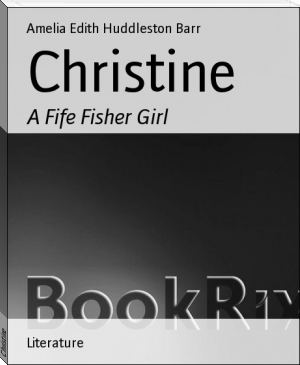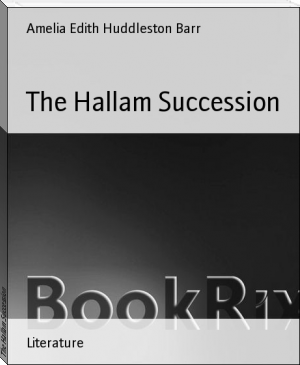Christine, Amelia Edith Huddleston Barr [chromebook ebook reader txt] 📗

- Author: Amelia Edith Huddleston Barr
Book online «Christine, Amelia Edith Huddleston Barr [chromebook ebook reader txt] 📗». Author Amelia Edith Huddleston Barr
"I do know it, Sir. I thank you for your kind words anent my dear feyther and mither; and I shall be a very proud and happy girl, if you will stand a few minutes by the side o' Cluny and Christine. It will be for our honor and pleasure!"
"Captain Macpherson asked me to call and see him, and I will then find out your arrangements, and very proudly drop into them." Then he walked to the foot of the hill with her, and could not help noticing the school, from which at least eighty boys and girls were issuing with a shout and a leap for the playground. On this sight he looked pleasantly for a few moments, and then smiling at Christine said:
"Our enterprise! It appears to be attractive."
Not knowing just what reply to make, she smiled, and nodded, and gave him her hand. "Good-by, Christine! May I call you Christine? In a day or two it will not be permissible. May I say it until then?"
"Christine is my name. Call me Christine always."
"Captain Macpherson would have something to say to that."
"What for? He has naething to do with my name."
"The first thing he does, after you are his wife, is to change it."
"He can only change the family name. Every one o' us in the family has that name. It is common to all, far and near. Cluny can change that, and I hae no objections; but he wouldna daur to touch a letter of my christened name. That is my ain, as much as my hands and my eyes are my ain--ay, and a gey bit mair sae--for a man may claim the wark o' your hands, and the glint o' your e'en, but he canna mak' use o' your name. It is o'er near forgery--and punishment. Sae I am Christine to yoursel' neither for wark, nor for use, but just for pure honest friendship--Christine, as lang as we baith wish it sae."
"Thank you, Christine. I am proud of the favor!"
Now I am beggared for words, when I come to try any description of Cluny's wonderful joy in the final fruition of his long-delayed hopes. When he landed, he was at first volubly happy. He told everyone he was going to be married. He expected everyone to rejoice with him. All his thoughts, words, and actions were tinctured with Christine. Men looked at him, and listened to him, with pity or envy, and one of the greatest of Glasgow's mercantile magnates cried out enviously--"Oh, man! Man! I would gie all I possess to be as divinely mad as you are--just for one twenty-four hours!"
But joy at its very deepest and holiest turns strangely silent. The words it needs have not yet been invented, and when Cluny was free of all duty, and could come to the very presence of his Beloved, he could say nothing but her name, "Christine! Christine!" almost in a whisper--and then a pause, a pause whose silence was sweeter far than any words could have been. Speech came later, in passionate terms of long and faithful love, in wonder at her beauty, ten-fold finer than ever, in admiration of her lovely dress, her softer speech, her gentler manner. She was a Christine mentalized by her reading and writing, and spiritualized by her contact with the sick and suffering little children of the past months. Also, love purifies the heart it burns in.
Everything was ready for the marriage, and it was solemnized on Saturday morning in the Ruleson home. The large living room was a bower of fresh green things, and made gay and sweet with the first spring flowers. The marriage table was laid there also, but the Domine stood on the hearthstone, and on the very altar of the home in which Christine had grown to such a lovely and perfect womanhood, she became the wife of Captain Cluny Macpherson.
That day when Cluny came in to the bridal, he wore for the very first time his uniform as captain of the new steamer just finishing for him. For he had asked one great favor for himself, which was readily granted, namely, that his commission as captain be dated on his wedding day. So then he received his wife and his ship at the same time. The room was crowded with men and women who had known him from boyhood, and when he appeared, it was hard work to refrain from greeting him with a shout of "Welcome, Captain!" But it was the light of joy and admiration in Christine's face, which repaid him for the long years of working and waiting for this gloriously compensating hour.
The Colonel said he had the honor of assisting at the wedding of the handsomest couple in Scotland. And it was not altogether an exaggeration. Christine in her white satin gown, with white rose buds in her golden hair, and on her breast--tender, intelligent, intensely womanly was the very mate--in difference--for Cluny, whose sea-beaten beauty, and splendid manhood were so fittingly emphasized by the gold bands and lace and buttons, which Jamie had once called "his trimmings." He wore them now with becoming dignity, for he knew their value, because he had paid their price.
There was a crowded breakfast table after the ceremony. The Domine blessed the meal, and the Colonel made a flattering speech to the people of Culraine--his people--he called them; promising them better water, and better sanitary arrangements, and another teacher who would look especially after the boys' athletic games and exercises. During this speech the Captain and his bride slipped away to the train, in the Colonel's carriage, and when it returned for the Colonel, the wedding guests were scattering, and the long-looked-for event was over.
Over to the public, but to the newly-wed couple it was just beginning. To them, the long, silent strings of hitherto meaningless life, were thrilling with strange and overwhelming melodies. Marriage had instantly given a new meaning to both lives. For the key to life is in the heart, not in the brain; and marriage is the mystical blending of two souls, when self is lost, and found again in the being of another. It was with them,
That ever working miracle of God,
The green and vital mystery of love,
Still budding in the garden of the heart.
The wedding festivities over, all excitement about it quickly subsided. Christine would be sure to come back again, Cluny would return at stated periods, and always bring with him the air and flavor of lands strange and far off. Their farewells would always be short ones. Their presence would always be a benefaction. There was nothing to discuss, or wonder over, and the preparations for the herring season were far behind-hand. They could talk about the wedding later, at present the nets and the boats were the great anxiety in every house in the village. So Christine and Cluny with little observation,
Sailed happily into the future,
Wherever their wishes inclined them;
Love and Good Fortune as shipmates,
And Troubles always a mile behind them.[*]
[*] A fisherman's toast or blessing.
CHAPTER XIV
AFTER MANY YEARS
Her life intensive rather than extensive; striking root downward,
deep in the heart, not wide in the world.
A memory of dew and light, threaded with tears.
Not long before the breaking out of the present European war, I was in London, and needed a typist, so I went to a proper Intelligence Office on the Strand, and left a request directing them to send any likely applicant to my hotel for a conversation. On the next afternoon I heard a woman's voice in an altercation with the bellboy. I opened the door, and the boy said he could not quite make out the lady; he was very sorry indeed, but the lady would not explain; and so forth.
The lady looked at the premature little man with contempt, and said a few passionate words of such unmistakable Scotch, that I felt the bellboy to be well within the pale of excusable ignorance.
"Are you from the Intelligence Office?" I asked.
"Yes, Madam. At the request of Scott and Lubbock I came to see you about copying a novel."
"Come in then," and as soon as the door was closed, I offered my hand, and said only one word--"Fife?"
"Ay," she answered proudly, "Fife! I can speak good English, but the stupid lad made me angry, and then I hae to tak' to the Scotch. I don't hae the English words to quarrel wi', and indeed if you want a few words of that kind, the Scotch words hae a tang in them that stings like a nettle, even if folk cannot quite make out the lady or gentleman that uses them."
I could not help laughing. "What words did you use?" I asked.
"Naething oot o' the way, I just told him, in a ceevil manner, that he was a feckless, fashious gowk, or something or ither o' an idiotic make. He was just telling me he didn't speak French, when you opened the door," and then she laughed in a very infectious manner. "But this is not business, Madam," she said, "and I will be glad to hear what you require."
Our business was soon pleasantly arranged, and just then, very opportunely, my five o'clock tea came in, and I asked Miss Sarah Lochrigg to stay, and drink a cup with me, and tell me all about the Scotland of her day. "It is fifty years since I left Scotland," I said, "there will be many changes since then."
She took off her hat and gloves and sat down. "I come from a fishing village on the coast of Fife. They don't change easily, or quickly, in a fishing village."
"What village? Was it Largo?"
"No. Culraine, a bit north of Largo."
"Never!"
"Ay, Culraine. Do you know the place?"
"I used to know people who lived there. Doctor Magnus Trenabie, for instance. Is he living yet?"
"No, he went the way of the righteous, twenty years ago. I remember him very well. He preached until the last day of his life, but he was so weak, and his eyesight so bad, that one of the elders helped him up the pulpit stairs, and another went up at the close of the service, and helped him down, and saw him safely home.
"One Sabbath morning, though he made no complaint, he found it difficult to pronounce the benediction, but with a great effort he raised his hands and face heavenward, and said every word plainly. Then he turned his face to the elder, and said, 'Help me home, Ruleson,' and both Ruleson and Tamsen took him there. He died sometime in the afternoon, while the whole kirk was praying for him, died so quietly, it was hard to tell the very time o' his flitting. He was here one minute, the next he was gone. In every cottage there was the feeling of death. He was really a rich man, and left a deal of money to the Ruleson school in Culraine village."
"Then





Comments (0)